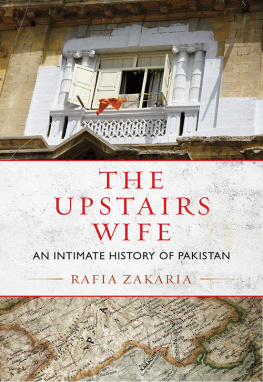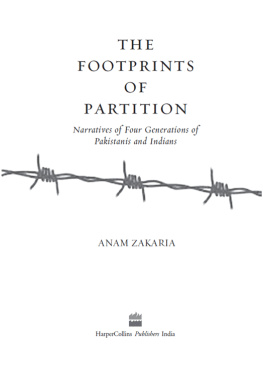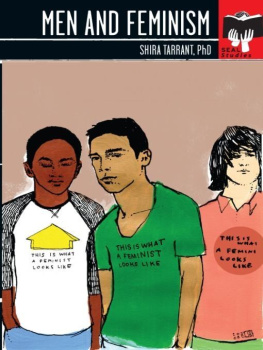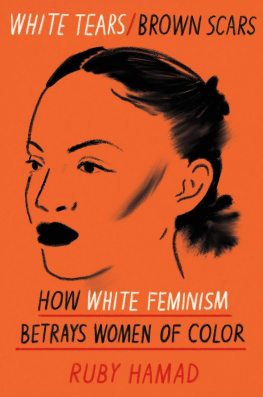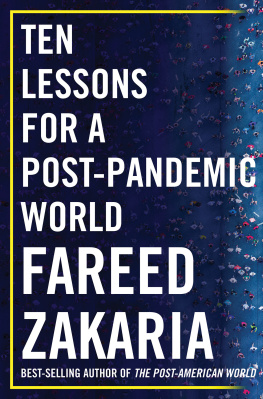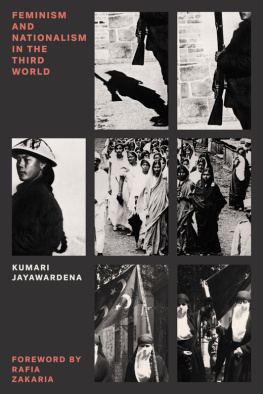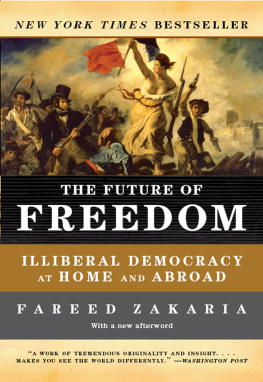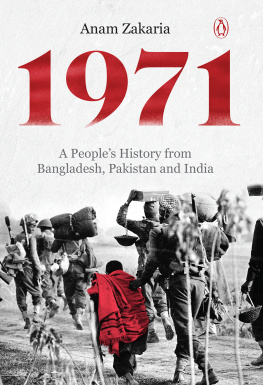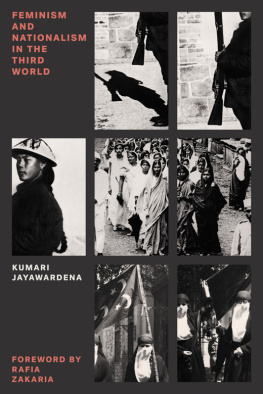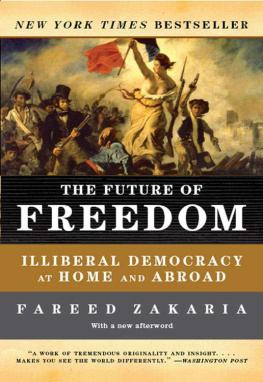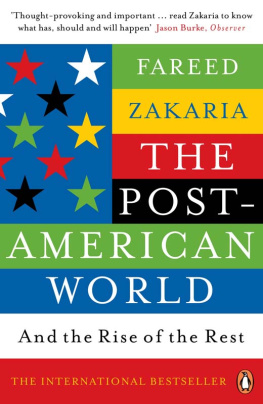Rafia Zakaria
AGAINST WHITE FEMINISM
Contents
About the Author
RAFIA ZAKARIA is an attorney, political philosopher, human rights activist and the author of two books: The Upstairs Wife and Veil . Her writing on global feminist and immigrant issues has appeared in The Baffler and DAWN , where she writes regular columns, as well as in The New York Times , Guardian , New Republic , Nation , CNN Opinion and more. She is currently a research scholar at the Colin Powell Center for Civic and Global Leadership at City College New York. Born and raised in Karachi, Rafia Zakaria now lives in Indiana.
Find her on Twitter @rafiazakaria
To Rania, my bright and shining star
Authors Note
A white feminist is someone who refuses to consider the role that whiteness and the racial privilege attached to it have played, and continue to play, in universalizing white feminist concerns, agendas and beliefs as those of all of feminism and all feminists. You do not have to be white to be a white feminist. It is also perfectly possible to be white and feminist and not be a white feminist. The term describes a set of assumptions and behaviours which have been baked into mainstream Western feminism, rather than describing the racial identity of its subjects. At the same time, it is true that most white feminists are indeed white, and that whiteness itself is at the core of white feminism.
A white feminist may be someone who earnestly salutes the precepts of intersectionality the need for feminism to reflect structural inequalities drawn along the lines of race, faith, class, disability, etc., as well as gender but fails to cede space to the feminists of colour who have been ignored, erased or excluded from the feminist movement. White feminists can attend civil rights marches, have friends who are women of colour, and in some cases be women of colour themselves, and yet be devoted to organizational structures or systems of knowledge that ensure that non-white womens experiences and thus their needs and priorities remain sidelined. More broadly, to be a white feminist you simply have to be a person who accepts the benefits conferred by white supremacy at the expense of people of colour, while claiming to support gender equality and solidarity with all women.
This book is a critique of whiteness within feminism; it is directed at pointing out what must be excised, what must be broken down, in order for something new something better to take its place. It explains why interventions that simply add non-white women to existing structures have not worked. Because it is a critique, it has not been possible to present the diversity of views that exist among and between feminists of colour. Others are doing this work, but for that effort to be given its due, this project of dismantling a white-centred history and practice has to be undertaken. This book examines what whiteness has enabled within the feminist movement; similar work can and must be done on how cis-heteronormativity, ableism, class privilege and other forms of privilege act within mainstream feminism.
The goal here is not to expel white women from feminism, but to excise whiteness, with all its assumptions of privilege and superiority, so as to foster the freedom and empowerment of all women.
Introduction: At a Wine Bar, a Group of Feminists
It is a warm fall evening and I am at a Manhattan wine bar with five other women. The mood is warm and cheerful. Two of the women are writers and journalists, like myself, and the other three work in the media or the publishing industry. Everyone, except for me, is white. I am excited to have been included this evening, eager to impress and befriend these women I have previously only known professionally through phone calls and emails.
The first hurdle comes when the waiter comes to take our order. Lets split a pitcher of sangria! someone says, and everyone agrees excitedly; then they turn to me, looking for agreement.
Im on some medications, but please, you guys go ahead Ill drink vicariously through you, I declare with a smile whose wattage aims to cover up the discomfort, my own and theirs. It is the truth, but I feel ashamed saying it. They know that I am Muslim and I imagine them wondering if I am too uptight to belong among them. Its not a religious thing, I add once the waiter is gone. You have no idea how much I would love a glass right now. There is laughter all around the table. Now I worry that the laughter is forced and that this audition to belong is already over.
The second hurdle arrives a little later, when everyone except me has been softened by sangria and is exchanging personal stories, bonding in the way youre supposed to at a wine bar in Manhattan on a warm fall evening. I see it coming when one of the women, a noted feminist author, looks at me mischievously. So, Rafia whats your story? she asks conspiratorially, as if Ive been hiding some tantalizing mystery.
Yeah, one of the others, an editor at a literary journal, chimes in. How did you even come here like, to America?
It is a question I detest so much that I once used it in a stand-up comedy set. I am performing now too, but I know a comedic response wont do; will seem like too much of a deflection. But I am prepared for this moment, not least because it has proven tricky to navigate so many times before. Often (as I dramatized in the stand-up routine) I offer up a few white lies. I tell people I came to America when I was eighteen to go to college and then stayed.
It is only two-thirds of a lie. The truth is, I came to America as a young bride. One night after dinner, sitting on the edge of my bed in mid-nineties Karachi, I agreed to an arranged marriage. I was seventeen; my husband, thirteen years older and a Pakistani-American doctor, had promised to allow me to go to college once we were married. There were other reasons why I said yes, but the possibility of going to college in the United States, something that my conservative family would never have allowed (or been able to afford), was a major factor. My life until then had been constrained in all sorts of ways, hardly extending beyond the walls that surrounded our home. I had never experienced freedom, so I gladly signed it away.
Arriving in the United States, I moved directly to Nashville, Tennessee. There I attended a Southern Baptist college (when it was still closely affiliated with the Church, and where exhortations promising fire and brimstone for all non-Baptists were commonplace), which my new husband had selected and enrolled me in and which I was to pay for via student loans. After graduating college, I begged him for permission to go to law school, to which I had applied, earning a partial scholarship. He refused, then relented, then changed his mind, reminding me that his marital promise had been to let me attend college, not law school.
The transactional nature of our relationship stared out at me. The next seven years did not change things for the better. During our last fight, the police officer who arrived on the scene took his cue from my suddenly calm and courteous husband and told me to patch it up. It was only much later that I learned that this is what police officers tell women who look to them for help, all the time.
I did not patch it up; I spent the night clutching my sleeping toddler. The next day, after my husband left to do his morning rounds at the hospital, I took her, a small suitcase of clothes, a box of toys and an inflatable mattress, and drove to a domestic violence shelter, an unmarked and unknown house. A woman with blonde hair and bright blue eyeshadow led me there. Just follow my car, she told me when we met at a Kmart parking lot; and I did, the Barney theme song playing on a loop inside my car to keep my daughter quiet.




